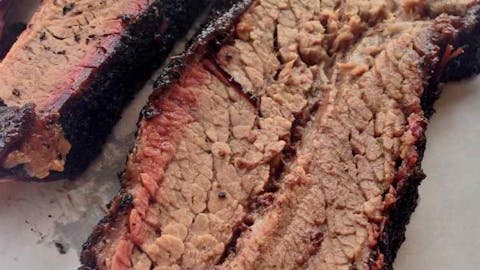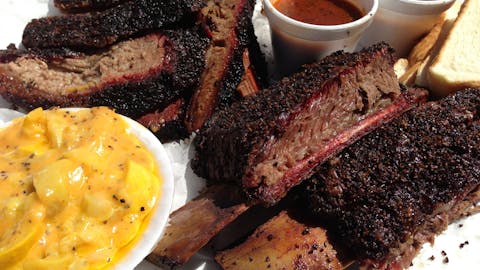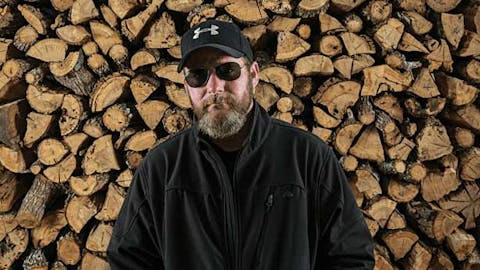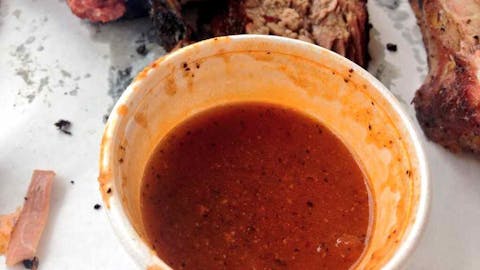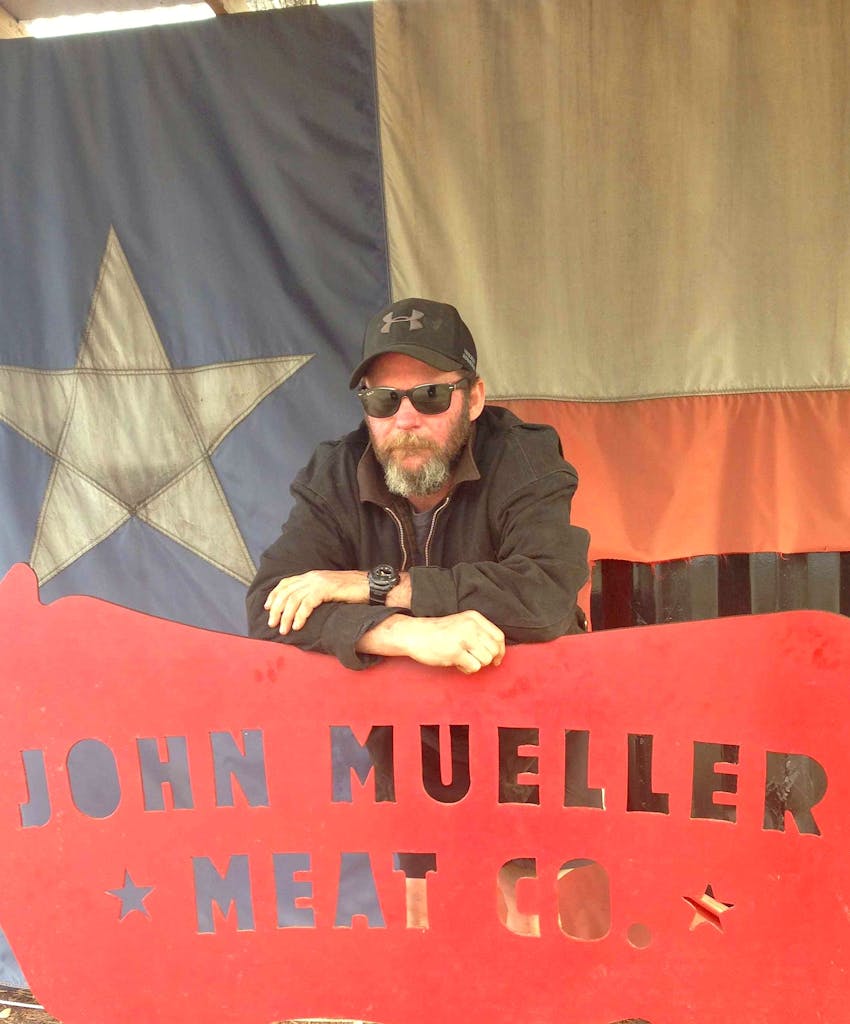 Owner/Pitmaster: John Mueller Meat Co.; Opened 2013
Owner/Pitmaster: John Mueller Meat Co.; Opened 2013
Age: 46
Smoker: Wood-fired Offset Smoker
Wood: Oak
Mercurial is often the word chosen to describe John Mueller. Verbal attacks on customers and employees are a regular occurrence, but they keep coming back for his famous barbecue. There’s a famous name involved too.
John’s father was the legendary Bobby Mueller who stoked the fires at the heralded Louie Mueller Barbecue in Taylor, Texas for decades before his death in 2008. John’s brother is Wayne who is now at the helm in Taylor and his sister LeAnn owns one of his biggest competitors, la Barbecue, down the street in a food trailer that used to be John’s professional home. John first came to Austin in 2001 when he opened a joint on Manor Road. The food got great reviews, but it closed after five years. Now he’s nearly two years into a stint on East Sixth Street and is as surly as ever.
We sat down at a picnic table in the mid afternoon in front of his barbecue trailer. Despite our spirited Twitter jabs, sitting with John and a few Bud Lights always makes for interesting conversation. Just don’t ever remind him of that bad slice of brisket he might have sold you a few months earlier.
Daniel Vaughn: It’s well known that you started working in barbecue at Louie Mueller Barbecue. What are your first memories of working there?
John Mueller: Cleaning trays and having to go there after church. We were open on Sundays back then. I was six. Fred [Fontaine] would work one Sunday and my dad [Bobby Mueller] would work the next one. After Sunday School, Wayne [Mueller] and I would go down there. We didn’t do the Sunday thing for long before my dad shut that down. That was the late ‘70’s. He needed to have some time off.
DV: I guess there was some floor sweeping and other odd jobs too?
JM: Yes. All the fun stuff.
DV: Did you have to clean out the pits?
JM: Oh yes. I cleaned that pit so many times. It caught fire every time we cleaned it.
DV: Did you just climb inside?
JM: Yeah. Dad would take the grates outside and scrape them. I was inside the pit. I’d crawl up in the little hatch and start shoveling. When I got a little older, I guess in high school, I started boning out meat for sausage, grinding it, and making sausage.
DV: Was that bull meat you were boning out for sausage back then?
JM: Yes. Bull meat and briskets. We’d use tallow that we’d get from Taylor Meat Co. After Fred left, dad started trimming out briskets and we’d use those trimmings.
DV: What sausages were on the menu then?
JM: There was just the regular sausage. Up until ’91 or ’92 we were just selling brisket, sausage, t-bones, and chucks. Then we started throwing on a couple slabs of pork ribs. They were in demand.
DV: The ribs were something that was added because customers were asking for them?
JM: It started with pork spare ribs. They started getting more popular. One time he bought a box of chuck short ribs and they just took off.
DV: When you said “chucks” before, did you mean the chuck ribs?
JM: No. That was chuck roll. Every morning we’d do six t-bones and a chuck roll.
DV: How did you cook the chuck rolls?
JM: They were cooked all the way through and sliced. The people that were eating them wouldn’t have had them any other way. It was a good piece of meat. I’ve done it here a few times. It’s just a matter of finding pit space.
DV: Did you cut the t-bone into steaks before smoking it?
JM: Yeah. They were about an inch thick. That’s how I got the idea on Manor Road to sell them there. It was a loss leader though. The damn steak cost me $20, and I was selling it for $6.99 per pound. Anyway, the steaks at Louie Mueller were for the early morning crowd, for the railroaders.
DV: The railroaders?
JM: The Union Pacific runs right through Taylor, and they’d come in early for dry sausage and stuff like that.
DV: Dry sausage was just yesterday’s sausage that was reheated?
JM: Yes. It was a big seller. They loved it.
DV: And pork ribs only started in the nineties?
JM: Yes. It was a year after I came back full time, so it had to have been ’92.
DV: Where were you before then?
JM: In Lubbock at Tech studying kinesiology. I was going to be a coach…football and track. My mom and dad made me go to school. I’m glad they did. It got me away from Taylor for a while.
DV: Did you play those sports in high school?
JM: Yeah. I ran a little bit and played some football. I was the left guard and linebacker.
DV: Were you the shortest linebacker on the team?
JM: No. We were a pretty small team, but we were district champions too.
DV: But it was back to Taylor after college. Were there no jobs in kinesiology?
JM: I always knew I’d do barbecue. It was just a matter of my grandpa not wearing my dad down. I graduated high school in ’87 and Fred left in ’87. I would come home in the summers and work, but there was a huge period of time where it was my dad, a lady who ran the register, and Jessie who was bussing tables. He ran the whole thing basically by himself. It wore him down. I was engaged and I wanted to move back to Taylor. The Christmas Eve before I came back I called him and he said “Come on.” I started back on May 1st. I got married on the first of June.
DV: When did the menu start to expand into what we see today?
JM: The beef ribs were around ’96 or ’97. Right around when were planning the expansion, we started adding turkey. LeAnn brought in some fantastic chicken breasts that we added.
DV: What drove those choices?
JM: It was just sitting around and talking about how to make it better. We had limited pit space and beef prices had spiked back then too. Brisket prices went high. We were looking for an alternative. That’s when the other meats starting coming in.
DV: Your dad was the cook for so long, how did he transition you into doing some of the cooking?
JM: It was about a year after I got back full time. We had gotten into a good routine working together. He zigged and I zagged. One day he said “Okay. I’ll see you later.” It was a Friday morning about 6:30 and he just left. He wouldn’t answer the home phone. Nothing.
DV: That was your test?
JM: Yeah, it was a test.
DV: Were you s—ing your pants?
JM: I did. I probably burned half the meat up on that pit, but I got through a lunch service.
DV: At what point did you feel comfortable cooking there?
JM: When I went to Manor Road.
DV: Did you never get comfortable in Taylor?
JM: I was watching him and we had two different styles. I couldn’t get into doing my stuff there. I’ve always wanted to cook hot and fast because I have no patience. He had tons of patience. It would drive him crazy every time I lifted that lid. You’d think his head was going to explode, but I had to see what was going on in there. I still do.
DV: The old adage “If you’re looking you ain’t cooking” doesn’t apply to you?
JM: I don’t believe in that. Not when you’re burning 400 degrees.
DV: Is that the temp you run?
JM: I don’t know. It’s close.
DV: How do you know when it’s hot enough then? Does it sizzle?
JM: I can feel it on my face when I open that door. I also look at my fire just like he taught me, but my fire’s just a little bit hotter than his.
DV: How did the decision come about to move to Manor Road? Was it something you thought about for a while?
JM: It’s well documented in Katy Vine’s article, but we had a rift. I went and sold groceries at Alliance Food Service for about three months. A guy contacted me and asked if I wanted to go back into the barbecue business.
DV: What was it like not working in barbecue?
JM: I hated it. I became what I hated most – a salesman. That’s just not me. “Buy my f—ing groceries, dammit!” It doesn’t work that way.
DV: But it works in barbecue?
JM: It does for me.
DV: How many people were on your staff when you opened Manor Road?
JM: It was my wife and Chris Banks.
DV: Did you do all the cooking?
JM: Yes. And the sides.
DV: Did you ever let anyone else help with the cooking?
JM: I started to let Chris help. He was good, but he got his masters from UT and he works at the LBJ Library now.
DV: How long did that business last?
JM: Until 2006.
DV: You made the Texas Monthly Top 50 in 2003. Did that surprise you at the time?
JM: Hell no. I was pissed off. I wasn’t in the top four or five. I was so mad.
DV: What was on the menu back then?
JM: We had everything. Brisket, sausage, pork ribs, beef ribs, turkey breast, prime rib, pork chops, and t-bones.
DV: How hard is it to run a barbecue business like that where you’re guessing on how much to cook of each meat every day?
JM: It’s impossible, but I was really ambitious.
DV: You were also trying to prove something, right?
JM: Yeah. I was.
DV: Do you feel like you proved it to yourself?
JM: No. I was just mad.
DV: You were closed before the next Top 50 came around. What led to the closure?
JM: The building was sold.
DV: What did Manor Road look like when you started?
JM: It was East Side Café, Mi Madre’s, Hoover’s, and me. That was it.
DV: During that time, Aaron Franklin worked for you. What did he do while he was there?
JM: He ran the register, cut squash, and cut onions. He didn’t cook. Aaron asked a lot of questions. He would season brisket and put them on, but that was pretty much it. He had the desire to cook and made that known to me. He said he wanted to be in the barbecue business because his parents were in the barbecue business. The most smart ass thing I ever said was to Aaron. He said “My parents used to be in the barbecue business.” I told him “You said the right thing. Used to be in the barbecue business. Now go cut squash.” I bet I was about halfway into a bottle of Weller’s by then.
DV: It was whiskey back then?
JM: Yeah.
DV: Now it’s Bud Light?
JM: Yes, but not all day. It was Weller’s all day then. I went through a handle a day.
DV: And that started when you lit the pit?
JM: Pretty much.
DV: Why weren’t you willing to make it easier on yourself and teach people like Aaron how to cook? Was that about quality control?
JM: It’s a combination of being a bad teacher and being a control freak. I can take if something is messed up and I did it, but if somebody else does it, then it’s not fun for those people. I had somebody here that I tried to teach, but it was like Groundhog Day. It was the same mistakes every day. Other people can teach really well, but I have a different deal. I’ll bury myself alive to prove I can work the shovel.
DV: What does your day look like now?
JM: I get here at 3:45. My staff comes in at 9:00.
DV: You drive in from Taylor every morning?
JM: No. I moved to Round Rock. I come in and light my fires. I have everything seasoned already from the day before. I put the meat on this one pit then get the potatoes and beans going.
DV: It’s just you for a few hours in the morning?
JM: That’s the only way I can do it.
DV: What are the mistakes that are made by those who can’t get the hang of barbecue?
JM: They don’t pay enough attention to the fire or to the meat. They don’t love it like I love it. In the back of my mind, I think maybe it’s just that it’s not their name on the place.
DV: Is that why you called it John Mueller Meat Co. instead of something like East Austin BBQ?
JM: Hell no. I’m famous. That’s why I call it John Mueller’s.
DV: Speaking of being famous, there was a great video on Zagat where you said “I made the Austin barbecue scene.” Let me defend you. When you opened Manor Road, most agreed that it was the best in town.
JM: That’s where I was coming from, and I stand behind that.
DV: How much was the Mueller name known in Austin then?
JM: Taylor barbecue wasn’t known nearly as much as Lockhart, but we had a fantastic product and we took Austin by storm.
DV: How much about your cooking has changed since then?
JM: I think it’s gotten better. There have been some times where it’s inconsistent. I’ll admit that, but it’s better overall.
DV: We don’t have to rehash all the well-documented details of your time on South First with the JMueller BBQ trailer, but you wanted to let people know very early that you were planning a comeback. We didn’t know each other at all then, but I got an email from you announcing it a year ahead of time. What pulled you back into Austin to cook barbecue after several years of being gone?
JM: I got tired of reading about other people.
DV: Like others in Austin, or your brother?
JM: Wayne hasn’t bothered me. He’s great at what he does up there, and I mean that sincerely. But you’ve got those others out there like Aaron and the other places. And it started to annoy me. I started telling everybody, because I knew if I kept telling people I was coming back, I’d have to make it happen. It was a long process.
DV: You almost forced yourself back into it?
JM: Yes. We started using the American Legion pits to do some catering. I got a call from a guy who wanted to open a place on South First. I knew I needed to get into social media. I know that’s a big part of Aaron’s success. He came in at the right time, and it launched him. I knew we could catch some of that, especially with the comeback story. Then Katy’s story was huge.
DV: Do you remember the day you opened on South First Street?
JM: October 23, 2011.
DV: Franklin Barbecue had been around for about three years by that time.
JM: And everyone wanted to poke the bear between he and I. They all wanted that showdown that was never going to happen.
DV: But you asked for that showdown to happen to. You wanted it.
JM: No I didn’t want it. I wanted to talk about it. It’s easy for me to be the mouth out here and drum up business, but it would be stupid for him to do it.
DV: How much of that mouth is you and how much of it is a persona that you feel people expect out of you?
JM: It has become a persona. If you come out here, you know I’m not the Dark Prince of barbecue most of the time.
DV: But it’s a great title to have.
JM: It’s the best title in the world. People love that. It softened the blow when I wasn’t in the top four in 2013 [laughing]. At least I got the title out of it.
[Almost on cue, a man drops by on a motorcycle and starts walking around the pit. John reacts swiftly.] I don’t walk around in your backyard. Go order some food. [The man looks stunned and walks back to his motorcycle without any barbecue.]
DV: Back at the JMueller BBQ trailer, you served Anthony Bourdain. Was that nerve racking, or just another day at work?
JM: Do you want me to be honest? He and I were probably in the same shape that morning.
DV: He had just gotten a late night tattoo.
JM: I was excited about it, but I’ve been through so many of them. It puts you on your toes, but you can’t put yourself into the whole thing. I didn’t want to run up and meet him. I just wanted to make sure the product was great, and it was. I didn’t know what kind of impact it would have. It put us over the top.
DV: How long after it aired were you asked to leave JMueller BBQ by your sister?
JM: I don’t know. It was the day before Halloween in 2012.
DV: I think when that episode of No Reservations aired, you were catching up to the popularity of Franklin Barbecue at that time, but then he’s just gone to another level since.
JM: Nobody’s ever going to get that popular. That’s a phenom. That’s the last of it, so you just have to accept your role and move on. You just have to be who you are.
DV: It wasn’t long before this spot opened.
JM: It was February 25, 2013. I was only off a few months.
DV: You’re coming up on a two year anniversary. Now you’ll be eligible for the top 4 or 5.
JM: I probably won’t even make the Top 50 this time around [laughing].
DV: You need to stay open.
JM: I’ll be here. It may be down to every Saturday like Snow’s, but I’ll be here.
DV: What’s your view on what its like to cook barbecue in Austin now versus just fifteen years ago?
JM: It’s crazy. It makes it hard on people like me. These guys are creative. What am I going to do? Throw some Sriracha on coleslaw and say I’m a gourmet chef?
DV: You’ve tried it. Then there’s the squash.
JM: The squash recipe came from college when I went to K-Bob’s. What these guys do out here is amazing, They put a lot of thought into it. Grunts like me just cook meat. We’re not innovative.
DV: Do you think there’s nothing you can change about your technique, or are there things you could change at this point?
JM: I’m sure there is, but I’m not going to. That’s gets me thinking, and when I start thinking and I’m on that pit, we’re in a whole lot of trouble. The only thing I’ve done differently is that sweet glaze I put on those pork ribs. That’s about as far as I’m gonna go.
DV: What’s in that glaze?
JM: It’s just Karo Syrup and Italian dressing. My neighbor gave me the recipe, but I’m not telling you how much of what to put in there.
DV: So you’re happy to take cooking tips from your neighbor, but not from any of the other barbecue professionals in town?
JM: Exactly. I’m sure I could learn a lot from them, but I just don’t have the patience.
DV: With all the great local barbecue, do you ever get out and eat other people’s barbecue?
JM: It’s rare that I eat anything outside of my own barbecue, but tonight I’m excited to go out to the Cele Store for the first time. I’ve heard so much about it. I want to see the building, the atmosphere, and drink a couple of beers. From what I hear, it’s good barbecue.
DV: How much of your own barbecue do you eat? Do you ever sit down with a plate of it?
JM: No. I just pick at it all day long, but I eat it every day.
DV: Is it harder to run a barbecue joint around here with all the competition, or is it easier because so many people now come to Austin for barbecue?
JM: It’s a lot harder. I’m lucky because of my name to get people on weekends, but you have to grind it out the first part of the week.
DV: How much is the difference in your weekday and weekend business?
JM: It’s about double on the weekend?
DV: And how many briskets do you cook on the weekend?
JM: There you are with that question again. How much money do you make a year?
DV: Fair enough. You don’t live in Taylor, but you did until recently. When is that last time you visited Louie Mueller?
JM: It was about three years ago. I went in with my mom and LeAnn.
DV: You spent so much time there and learned from…
JM: …the best.
DV: You learned so much from your father. Do you remember how you heard that he passed away?
JM: My mom called me that morning. I hung up on her.
DV: Because you didn’t want to believe it?
JM: Yeah. I thought about it and called her back.
DV: What sort of relationship did you have with him at that point?
JM: We were at a baseball game together three weeks earlier.
DV: Did you talk about barbecue much with him?
JM: A little. It’s not something he liked to go home and talk about. After all day and all those years, if the conversation around the dinner table got around to business, he’d squash it pretty quick.
DV: Back when Louie Mueller started serving barbecue is was functional. They were cooking leftovers and nobody was complaining if it wasn’t as moist or as smoky from day to day. With all the positive attention that barbecue has gotten recently, how do you deal with everyone coming in here as a potential critic?
JM: You know, everybody’s better in their backyard than you are. It’s been that way since the beginning of time. I’ve heard that in line at Louie Mueller since I was a kid. My dad used to say, “Yeah, but I can make a living at it.” I subscribe to that. These people are proud of what they cook, and I’m proud of what I do, but I’m not going to their backyard to spend money. If I cook a steak in my backyard it’s going to be better than any steakhouse steak to me, because I put the time in to do it.
DV: I feel like they should be able to make their one brisket better than yours if they’re any good. In the backyard you get to pay attention to just one brisket and serve it at its peak.
JM: That’s right. You do one in your backyard then come do thirty with me along with beef ribs, pork ribs, turkey, and sausage. Come do that alone between 4:00 and 10:00 in the morning. Do that every day, then do it well every day. That’s a whole different conversation.
DV: The older generation of pitmasters look at their job like any other. They might as well be a carpenter, but nowadays you’re expected to let it consume your entire life. How do you balance that?
JM: It’s both. It just a job. It’s what we do. It’s a passion, but it’s like going to any job in the morning. It’s also a pseudo celebrity thing too. You take it all for what it is. Like I’ve told you before, I can burn it up with the best of them.
DV: Yes. I’ve eaten some of it.
JM: Thanks, a–hole.
DV: Are you still having fun?
JM: I’m having a blast. I still look forward to coming in every morning.
Correction: A previous version of this interview included Mueller’s recounting of an anecdote that has since been disputed. That material has been removed and the interview has been updated.
- More About:
- John Mueller


